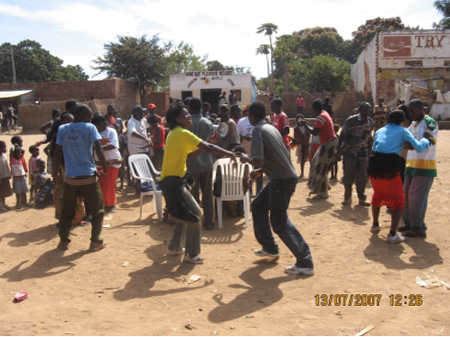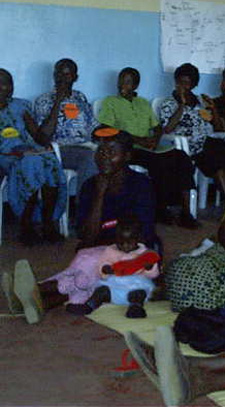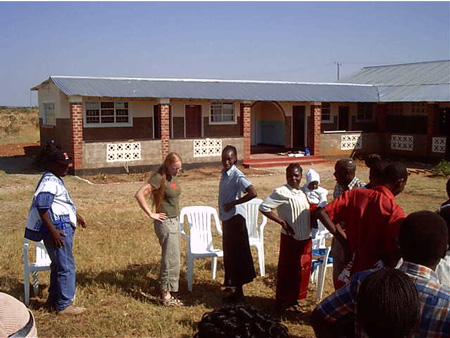Zambia
Reflect and HIV/AIDS
People’s Action Forum (PAF)
Country Profile
Population: 11 668 000 (2005)
Population below national poverty line: 72.9 % (1998)
HIV-rate in adults (15-49): 16.5 % (2003)
Context
Reflect circles are made up of community members who discuss issues or problems and take agreed actions on them. Their members include people in need of literacy lessons who are divided into beginner’s, medium-level and advanced learner groups. This means that a variety of learners is involved, ranging from those learning the most basic of skills, such as how to hold a pencil to those who concentrate on polishing their existing reading and writing skills.
A community agrees on the need to form a Reflect circle and then identifies members of the community who are willing to act as facilitators. Although the latter must at least be able to read and write adequately, this process of selection nevertheless produces facilitators with varied educational skill levels. Facilitators are then trained to lead the process of identifying needs and agreeing on action points, and to provide reading/writing/numeracy instruction using participatory tools. Both the literacy education and the related analyses/discussions are generated from the identified problem or issue following the Reflect learning process.
A critical issue raised in Reflect circles is that of HIV/AIDS. Community members saw that any small advances in the overall standard of living were quickly being eroded by the cost of being infected and affected by HIV/AIDS. The cost was felt in the frequent treatment and care costs, the special food requirements and the resultant lack of productivity. At the same time, there was the problem of the stigma and silence surrounding HIV/AIDS. It was evident that the spread of the epidemic was exacerbated by the fact that many were illiterate and unable to access relevant written information and were therefore unaware of the facts.
Women were found to be particularly affected by these problems. Participants in Reflect circles found it challenging to deal with the effect that these problems had on their lives, while facilitators were faced with the task of creating a favourable environment for discussing the difficult issues of stigma and discrimination and delicate subject matters such as sexuality and infidelity.

Programme
PAF’s overall goal has been to address the challenge of illiteracy through providing access to literacy learning opportunities, thereby enabling people to read and interpret the the wider world. This approach has allowed communities to play a part in providing the solutions to their needs, as it is based on the principle that all communities have the innate capacity to find their own solutions to their needs. The use of vernacular languages during the activities encourages participants to communicate with one another. Reflect facilitates the development of critical thinking as a process of learning for and through action. In this way, communities can be empowered in the face of HIV/AIDS to understand and share messages of prevention and mitigation. They can be helped to begin to face the challenge of improving their livelihoods. The immediate objective is therefore to use non-formal education to contribute towards the decrease of HIV/AIDS in Zambia.
The programme is situated in Mazabuka, (165 km from Lusaka), where target groups consist of members of the communities of Nega-Nega, Lubombo and Magobo and include those infected and affected by HIV/AIDS.
Upon receiving funding from the International HIV/AIDS Alliance, Mazabuka became the PAF’s main branch for its pilot HIV programme. It undertook the following activities:
- An anti-AIDS club was trained in drama and performance skills. The group performed in all sub-branches, schools, fishing camps and on commercial farms.
- An HIV/AIDS sensitization campaign incorporating drama and community discussion meetings was started in the third quarter of 2004.
- By the first quarter of 2005, 100 people had been equipped with a basic knowledge of HIV/AIDS in order to enable them to act as community facilitators of change.
- Care-givers were trained and a pilot project for home-based care was established.

These diverse activities helped to break the silence surrounding sexuality and HIV/AIDs, paving the way for communities to seek solutions to the numerous related problems. In 2006, this work was extended to mobile Voluntary Counselling and Testing (VCT), Anti-Retroviral Therapy (ART) adherence and palliative care training, provided mainly by Reflect facilitators. Communities are being provided with a CD4 count referral service where samples are collected, taken to hospital and results returned to them for further care. In 2007, the drama team was provided with training in Theatre for Development (TfD) in order to strengthen its community mobilisation skills.
The initial Reflect training and introduction to HIV/AIDS for facilitators was provided by a core training team. During the discussions centring on HIV, facilitators were given basic information about the nature of the disease, its spread and the way in which it can be prevented. They also learned how to use participatory tools and mobilisation skills. The follow up has been specialised training by professionals in areas such as caring for patients and administering ART.
Although refresher courses should ideally be provided at least once a year, they have tended to take place every 2 years depending on the funds available. As the programme has taken root and grown, there has been a surge of interest in areas related to developmental initiatives for which the core team has no expertise. Embedded in facilitator training is the understanding of the importance of networking as a means of facilitating access. Mazabuka has been most successful both in supporting the personal development of its facilitators and in boosting their capacity to lead the development process. As the programme developed, it became apparent that it would not be possible to prescribe exact and uniform steps for growth if people were indeed to be allowed their right to think, create and act as their environment dictated.
The facilitators’ education currently ranges from 7th Grade (primary) to post secondary school level. The latter group of facilitators may include those who have passed 12th Grade or retired people; for example, the lead facilitator is a former school teacher, while the CABLAC supervisor is a retired police officer.
In order to bring the different activities together, PAF has created innovative Capacity Building Learning Activity Centres (CABLAC). The CABLAC supports community initiatives both as a physical structure that may be visited and as a symbol of what Reflect stands for. It is a centre (accessible and open to all), where people are a part of their own building up (empowering), learning for and through action (discussion and analysis for bringing about development). The three objectives of the CABLAC are to: 1) act as focal points for enhancing problem-solving capacities drawing on and bringing together the vast inherent wisdom and experience within the community; 2) enhance group cohesion among local people by reactivating a sense of unity of purpose supported by traditional leadership; and 3) establish a culture of lifelong learning by promoting the concept of the richness of learning across generations, between the sexes and from ‘birth to death’.
Another innovation is the Theatre for Development (TfD). PAF’s approach to community development activities is anchored in its use of non-formal education to motivate learners to take action to improve their own circumstances, and undertake a critical analysis of their environment. TfD and Reflect techniques are critical in encouraging community members to participate in community issues. TfD is a step up from use of drama as a tool in Reflect processes, and has been found to be an extremely useful means of pinpointing issues, enabling people to reflect and take action on the sensitive topics of sex and death that surround HIV. Drama groups in two of the branches have received training and are now able to use their talents effectively to inform as well as to entertain.
Materials, books and other resources that provide information on HIV and supplementary reading for literacy learning are sourced from Government offices and local and international donors. Mazabuka has two main funders that provide both long-term and short-term grants.
PAF Mazabuka organises 14 (education and development) circles in three areas, each of which had an average of 21 participants in 2007. The literacy groups are sub-groups within the wider circle, and are formed according to the learners’ different levels of ability. No one ‘graduates’ from the group, as members continue to participate in the action planning process and related activities. Due to the learners’ need for accreditation following completion, it has now been agreed that classes will be offered to prepare learners to sit examinations for each level at the local Government school.
Learning outcomes are currently assessed according to learning criteria listed in the actions agreed upon by the participants. The groups’ ability to internalise these processes and make them their own is also increasing. Those for whom learning has taken root confidently plan their own programmes, as well as participating or even taking the lead in their implementation.

Lessons learned
Reports have indicated that Reflect activities have succeeded in developing communities’ capacity prevent and mitigate HIV/AIDS. The behaviour of most community members changed as they became aware that they could be infected and they were all affected by the disease.
The sensitisation process also had the effect that people were voluntarily presenting themselves for counselling and testing. They were therefore aware of their HIV status and started taking ARV’s when found to be HIV positive. This reduced pressure on hospital facilities, allowing more people to work and take care of their families and reducing the number of children on the streets.
It has also been observed that women are now willing to be leaders, whereas previously they would only select men to occupy influential positions at all levels. Women have realised that it is their right to negotiate for safe sex. They have insisted that providers not only supply male but also female condoms.
A recent assessment of the Mazabuka programme identified the following key issues:
- Continuous training for facilitators not only motivates them to conduct their work but also to conduct it diligently and to a high standard. There is a saying in one of the Zambian languages that states that “it is important to keep the knife sharp for it to cut properly”.
- People will attend adult learning sessions in larger numbers and pay more attention when the appointed dates, days and times are convenient for the participants. For example, it would be inappropriate to hold learning activities on Saturdays and Sundays when most people attend church, or organise training sessions during the agriculture season. It has been noted that the activity should not require people to leave their locality, nor should it be so time-consuming as to interrupt their daily routines significantly.
- The recipients of adult non-formal learning better understand and appreciate the use of approaches that relate directly to the way people live. The use of songs in the local language or drama based on stories to which they can relate to appears to yield better results and a more profound understanding, especially when a participatory approach is adopted. Content should be focused on the felt needs of the people. It was clear that as people had demanded information and knowledge, they would also be able to invest their time and resources to obtain them.
Gina Mumba Chiwela Fundafunda has been PAF’s Programme Development Manager and a Reflect trainer since 2001. Gina is the National Coordinator for the Pamoja Zambia Reflect Network, currently hosted by PAF, and acts as its local representative in the Africa Council that oversees the regional network.
Contact
Peoples Action Forum
Box 33709
Lusaka, Zambia
thando_g@yahoo.com
gina@paf.org.zm

 Homepage
Homepage